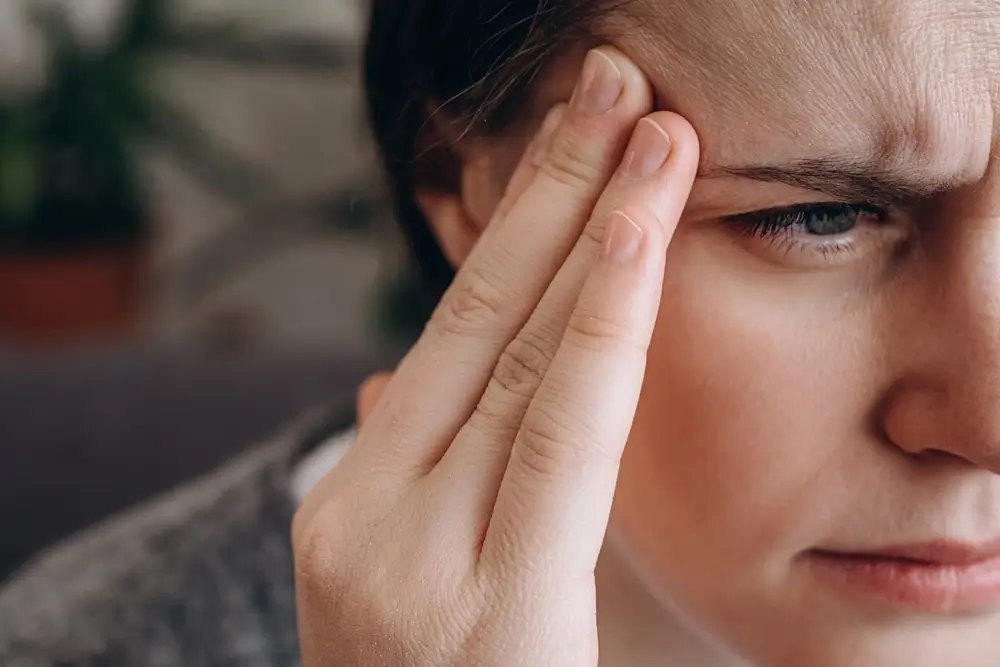Tension headaches are one of the most common types of headaches, affecting millions of people worldwide.
Often known as a constant, dull pain or pressure around the forehead, temples, or the back of the head, these headaches can range from mild to severe.
Unlike migraines, tension headaches typically don’t cause nausea or sensitivity to light, but they can still significantly impact your daily activities.
In this article, we’ll explore the causes, symptoms, and treatment options available to help you manage and alleviate the discomfort of tension headaches.
What Is a Tension Headache?
A tension headache is characterized by a dull, persistent pain or pressure that usually affects both sides of the head. Often described as a tight band or squeezing sensation around the forehead or temples, it can range from mild to moderate intensity and typically lasts anywhere from 30 minutes to several hours.
Unlike migraines, tension headaches don’t cause nausea or extreme sensitivity to light and sound. They are usually caused by muscle tension in the head, neck, and shoulders and are often triggered by stress or other factors.

Types of Tension Headaches
Tension headaches are categorized into two main types:
- Episodic Tension Headaches: These occur less frequently, typically less than 15 days per month. They are often triggered by stress or poor posture.
- Chronic Tension Headaches: These are more persistent and happen more than 15 days per month, lasting for longer periods of time. Chronic tension headaches may develop due to prolonged stress or muscle strain.
- Stress-Induced Tension Headaches: These are brought on specifically by emotional or physical stress, causing increased muscle tension in the head and neck area.
- Cervicogenic Tension Headaches: This type is associated with neck pain and discomfort, where the tension in the neck muscles extends to the head.
Are Tension Headaches Common?
Yes, tension headaches are one of the most common types of headaches experienced worldwide. It’s estimated that nearly 75% of adults will experience at least one tension headache in their lifetime, with many people suffering from them regularly. While both men and women can experience tension headaches, they are more prevalent in women, particularly during their 30s to 50s. Factors like stress, anxiety, and muscle strain play significant roles in the onset of these headaches, making them a frequent health concern.
Symptoms of Tension Headaches
Tension headaches are characterized by a set of common symptoms, which may include:
- Dull, constant pain on both sides of the head.
- Pressure or tightness around the forehead or temples.
- Tenderness in the scalp, neck, or shoulder muscles.
- Mild to moderate pain that does not worsen with physical activity.
- Difficulty concentrating due to discomfort.
These symptoms may last from a few hours to several days, depending on the severity and type of tension headache.
Causes and Triggers of Tension Headaches
Tension headaches are often caused by a combination of physical and emotional factors. They are typically linked to muscle tension, stress, and poor posture. Common causes and triggers include:
- Stress and anxiety: Emotional or mental stress is one of the leading triggers of tension headaches.
- Muscle strain: Tight muscles in the neck, shoulders, and scalp can cause tension headaches.
- Poor posture: Slouching or sitting in one position for too long can strain muscles and lead to headaches.
- Lack of sleep: Insufficient rest can contribute to the development of tension headaches.
- Eyestrain: Prolonged screen time or reading without adequate breaks can trigger headaches due to eye muscle fatigue.

Treatment Options for Tension Headaches
While tension headaches can be uncomfortable and persistent, there are various treatment options available to help relieve the symptoms and prevent future occurrences. These treatments range from over-the-counter medications to lifestyle changes and stress management techniques. Finding the right combination for your individual needs can significantly reduce the frequency and intensity of your headaches.
Over-the-counter (OTC) Pain Relievers
For many people, over-the-counter (OTC) pain relievers can be an effective first line of defense against tension headaches. Medications such as ibuprofen (Advil, Motrin), acetaminophen (Tylenol), and naproxen (Aleve) can help reduce the pain and inflammation associated with tension headaches.
These medications are easily accessible and can provide quick relief, but it’s important to use them sparingly to avoid medication overuse headaches, which can occur if these medications are taken too frequently.
Prescription Medications (for Chronic Tension Headaches)
For individuals who suffer from chronic tension headaches—defined as experiencing headaches 15 or more days per month—prescription medications may be necessary. Doctors may recommend tricyclic antidepressants (TCAs) like amitriptyline, which help manage chronic pain and prevent headaches from becoming more frequent.
Additionally, muscle relaxants may be prescribed to ease the muscle tension that contributes to headaches. In some cases, anti-seizure medications or botox injections may be used to reduce the severity of chronic tension headaches.
Stress Management Techniques
Since stress is a major trigger for tension headaches, adopting effective stress management techniques is an important part of treatment. Methods such as mindfulness meditation, deep breathing exercises, yoga, and progressive muscle relaxation can help reduce overall stress levels and prevent the onset of headaches.
Regularly practicing these techniques can teach your body to respond more calmly to stress, lowering your chances of experiencing a tension headache.
Physical Therapy and Stretching
Physical therapy and targeted stretching exercises can be extremely beneficial in relieving muscle tension and improving posture, both of which contribute to tension headaches. A physical therapist can guide you through exercises to strengthen the neck, back, and shoulder muscles, reducing strain and tension.
Regular stretching of these areas at home can also alleviate tightness and prevent headaches from occurring. Activities like neck rolls and shoulder shrugs are simple ways to relieve tension.
Lifestyle Changes
Making certain lifestyle changes can help reduce the frequency of tension headaches and improve overall well-being. Maintaining proper posture while sitting or standing, especially during long hours at a desk or in front of a screen, can prevent muscle strain.
Additionally, ensuring you get enough sleep each night, staying hydrated, and practicing regular physical activity can support your body’s resilience against headache triggers. Avoiding known triggers, such as excessive caffeine or alcohol, can also help reduce the likelihood of a headache.
Heat or Cold Therapy
Using heat or cold therapy can provide immediate relief for tension headaches. Applying a warm compress or heating pad to the neck and shoulders can relax tense muscles and increase blood flow to the affected area.
Alternatively, a cold pack can numb the pain and reduce inflammation. Switching between heat and cold therapy can also be effective in addressing both the tension and pain associated with tension headaches.
What are the Complications of Tension Headaches?
While tension headaches are usually not life-threatening, they can lead to persistent discomfort and interfere with daily activities. In some cases, untreated or frequent tension headaches may result in complications that affect your quality of life.
- Chronic Pain: Frequent tension headaches can become chronic, causing ongoing discomfort that can impact work, social life, and personal well-being.
- Medication Overuse Headaches: Over-reliance on over-the-counter pain medications to relieve tension headache symptoms can lead to medication overuse headaches, making the pain worse over time.
- Decreased Productivity and Mental Focus: Recurrent tension headaches can affect concentration, leading to reduced mental clarity, decreased productivity, and challenges in maintaining focus during daily tasks.
Prevention Tips for Tension Headaches
Preventing tension headaches involves adopting healthy habits and managing triggers that contribute to muscle strain and stress. By making small lifestyle changes, you can significantly reduce the frequency of these headaches and maintain overall well-being.
- Practice Stress Management: Engage in activities like yoga, meditation, or deep breathing to manage stress and avoid tension buildup.
- Maintain Good Posture: Be mindful of your posture while sitting, standing, or working to reduce strain on your neck and shoulder muscles.
- Regular Exercise: Stay active with regular physical exercise, especially activities that strengthen the neck and back muscles, which help alleviate tension.
- Take Breaks: If you work at a desk or use screens for long periods, make sure to take regular breaks to stretch and relieve muscle tightness.
When to Seek Medical Advice
If tension headaches become more frequent or severe, or if over-the-counter treatments are no longer effective, it may be time to consult with a healthcare provider. Additionally, if you experience any symptoms that are unusual or significantly disrupt your daily life, seeking medical advice or going to the nearest emergency room is essential to rule out other conditions and explore more comprehensive treatment options.

Find Relief from Tension Headaches Today
Tension headaches are common, but they don’t have to control your life. By recognizing the symptoms early and seeking appropriate treatment, you can alleviate discomfort and enjoy life without the burden of frequent headaches.
For immediate treatment and expert care, Aether Health is your trusted emergency room for situations like this. Visit us today to get started on the path to relief and better overall health.



